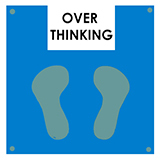 Once a week, I step on a scale that measures not only my weight, but also percentages of body fat, body water and muscle mass. When I see these numbers, I become more attentive to what I eat and how much I exercise. One morning, stepping on the scale, a thought arose. Wouldn't it be nice to have a scale that weighs my thoughts and can measure the percentage of wholesome and unwholesome thoughts? If I can get such information, then I could easily see how much and what kind of thoughts and emotions I carry. If the scale indicates that I'm overthinking, then I would meditate more to clear my mind. If the scale indicates an increase of unwholesome thoughts, then I would focus on eliminating such thoughts in order to stay calm and peaceful.
Once a week, I step on a scale that measures not only my weight, but also percentages of body fat, body water and muscle mass. When I see these numbers, I become more attentive to what I eat and how much I exercise. One morning, stepping on the scale, a thought arose. Wouldn't it be nice to have a scale that weighs my thoughts and can measure the percentage of wholesome and unwholesome thoughts? If I can get such information, then I could easily see how much and what kind of thoughts and emotions I carry. If the scale indicates that I'm overthinking, then I would meditate more to clear my mind. If the scale indicates an increase of unwholesome thoughts, then I would focus on eliminating such thoughts in order to stay calm and peaceful.
We are well aware of the detrimental health effects of excessive weight. Being overweight can cause high blood pressure, heart disease, diabetes and a host of other problems. In order to lose weight and keep it off, we go on special diets and exercise. While we spend much time, energy and money on physical health, how much care do we give to our mental health? We can ask ourselves how often we overthink and create unnecessary worries and anxieties that lead us to dukkha, a Pali word translated as "suffering," "anxiety" or "stress." With consideration that our mind and body work together, we need to take care of both mind and body to live a healthier and more peaceful life.
Our body is composed of the food that we have eaten throughout our life. What we eat today will be in our bloodstream, and it is our blood stream that builds and nourishes the tissues of our entire body. Similarly, our mind is composed of the thoughts that we have created and kept throughout our life. When we look deep into our own thoughts and actions, we can see that our thoughts become our words, our words become our actions and our actions become our habits and our habits become our character; what we are. That is why we pay attention to even a single thought in mind. It has the potential to become our character. Sotaesan, the Founding Master of Won Buddhism, said:
Human nature is originally neither wholesome nor unwholesome, but good or bad character comes into existence in accordance with one's habits. Habits are formed as one's initial thought responds repeatedly to various causes and conditions around oneself (The Scriptures of Won Buddhism, p.166).
Everything in our life today is conditioned by our thoughts, which are a product of the habitual pattern of our thinking from the past. Consequently, the condition of our life tomorrow will be formed by the thoughts we choose to entertain from this very moment onwards. From this perspective, we cannot change our environment while leaving our mind unchanged. As Einstein said, "We can't solve the problems by using the same kind of thinking we used when we created them." We need to change our thoughts to change our condition.
There are two simple but key guidelines to a healthy and fit body: healthy eating and regular exercise. We burn off unnecessary fats through regular exercise and nourish our body with healthy food. The same principle can be applied into our mental health: healthy thinking and regular meditation.
As long as we are alive, thoughts arise. But it doesn't mean that we have to carry them all the time. It would be too much if we have to process all thoughts. We need to select what to let go and what to nourish in our mind. Among many thoughts, some thoughts are positive, inspiring and necessary, which helps us to grow. Others are negative, depressing and unnecessary, and an obstacle to progress. Many of us are struggling with those negativities: jealousy, anxiety, anger, depression, resentment, self-criticism, and the list goes on. We can easily be swayed by those negative thoughts and let them dictate our life. Therefore it is wise to let go of these negative thoughts and nurture positive thoughts to bring out the best in us, to uncover Buddha nature within all of us.
Thinking is usually an automatic process, but with a developed awareness and concentration, we can select what we put into our mind. As we become responsive to our mind through meditation, we learn to nourish ourselves with positive and healthy thoughts and not dwell upon negative and destructive thoughts. This requires our conscious and consistent efforts - that is why we call it 'practice.' When we develop a regular meditation practice, we cultivate a strong mind muscle to clear the clutter in our mind and to nourish wisdom and compassion within all of us.